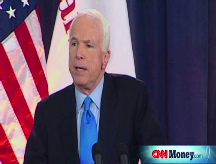Democrats compromise on oil drilling
Congressional Democrats want tax breaks for big oil companies repealed in return for supporting expanded off-shore oil drilling.
 |
| Republicans believe expanded oil drilling is a powerful political issue. |
WASHINGTON (CNN) -- Lawmakers return to Capitol Hill Monday to pick up where they left off in their bitter fight over energy legislation -- whether to allow more off-shore oil drilling to help relieve the sky-high price of gasoline that is hurting the economy and infuriating voters.
While there were signs of compromise over the August recess, many on Capitol Hill are skeptical a deal can be reached that would send a bill to the president's desk before the election.
Aides and congressional members from both parties acknowledge finger pointing is likely to trump legislative deal making during the truncated three week session before lawmakers return home to campaign for re-election.
Democratic leaders in the House and Senate, who long-resisted Republican-led calls to lift the ban on off-shore oil drilling, changed course over the recess and now say they will push comprehensive energy plans in September that will include expanded drilling.
But Democrats will insist energy bills also include their own priorities, such as repealing tax breaks for big oil companies, something many Republicans oppose.
"If this is going to be a fig leaf, a political document, than it's doomed to failure at the end of the day," Rep. Doc Hastings, R-Wash., said Friday about the package House Speaker Nancy Pelosi, D-Calif., is formulating.
Despite a recent dip in prices at the pump, Republicans believe expanded oil drilling remains a potent political issue. They feel emboldened by complaints they heard from constituents over the summer break, and they are convinced their August protest sessions on the House floor helped draw attention to lack of congressional action on energy policy.
Republicans also expect a boost from their vice presidential candidate, Alaska Gov. Sarah Palin, a strong advocate of drilling. Delegates at the Republican National convention last week showed their fervor for drilling by punctuating speeches with chants of "drill baby drill."
Republicans believe Democrats are underestimating the political importance voters give the issue. They point to Sen. Chuck Schumer, D-N.Y., the head of the Senate Democrats' campaign effort, who was quoted last month in "Politico," saying the drilling issue had "peaked" for voters.
Pelosi plans to unveil her bill by the end of the week, her office said. In addition to allowing limited drilling on the Outer Continental Shelf, the measure is expected to include curbs on market speculators, and provisions promoting the use of alternative sources of energy and requiring the release of millions of barrels of oil from the Strategic Oil Reserve.
"Democrats support drilling, but a 'drill only' plan would do nothing but drill deeper and deeper into your wallet," Rep. John Larson, D-Conn., said last week.
A bipartisan compromise group in the Senate known as the "Gang of 10" expanded to 16 members over the break. Several more members are expected to join this week, a source involved with the group told CNN. The bill the "gang" is pushing would tie new off-shore drilling to $84 billion in investments in conservation and use of alternative fuels.
Senate Majority Leader Harry Reid is working with the group and may link its bill to a package of tax breaks for producers of wind, solar, and other alternative fuels, an aide to the senator said.
Senate Republicans are wary of Reid because they don't think he will allow votes on their amendments, something they will insist upon, even if the bill includes provisions they support, like off-shore drilling, a Senate Republican leadership aide told CNN.
Senators are holding a bipartisan energy summit on Friday, sponsored by Reid and Senate GOP Leader Mitch McConnell, R- K.Y., to hear from industry experts, but it's not clear the summit will actually help bridge differences between many Democrats and Republicans.
The controversy over off-shore drilling could prompt a showdown later this month over a must-pass bill to fund the government through early 2009. The bill includes an annual extension of the moratorium on off-shore oil drilling. Republicans will attempt to strip it out, but if they fail, they could try to block passage of the entire spending bill which could lead to a partial government shutdown.
Such a gamble would be politically risky, but in an election year in which Republicans expect to lose seats in each chamber, some lawmakers may want to roll the dice. ![]()



